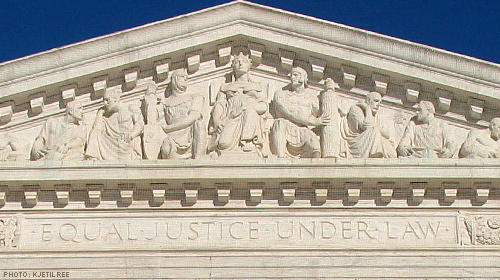
The façade of the U.S. Supreme Court bears the motto “equal justice under law.” But that ideal is not confined to our high court. People across this nation seek out the courts for equal justice – a fair hearing, regardless of skin color, creed, or wealth. I spent yesterday in one of those local courthouses -- in Brownsville Texas, just across the border from Mexico – observing the innocence hearing of former death-row prisoner Manuel Velez.
Hopes did not necessarily start high for Manuel and his many family members in attendance. That’s understandable. The last time they were in this courthouse was 2008. Manuel was convicted and sentenced to die for a crime he did not commit based, at best, on half- truths and incomplete and unreliable medical evidence. A poor person, Manuel had been assigned attorneys to safeguard his rights, but the attorneys, including one known for a drinking problem, did nothing to expose the huge and readily identifiable problems in the state’s case. With the state’s spurious claims going completely untested, this wasn’t a fair trial for Manuel; it wasn’t the fair shot at justice we count on as Americans.
That picture changed with the opening of yesterday’s hearing. Many of Manuel’s family members appeared in a strong show of support – his father, mother, two sisters, brother, a nephew and others were present. The family could see that Manuel now had lawyers who would stand up and fight for his rights. They could also see that the 2008 trial judge, Abel Limas, was gone from the bench, having been federally convicted of corruption. The family could see that his replacement, the Hon. Elia Cornejo Lopez, was intensely interested in the facts of the case, asked her own questions, and showed fairness to both sides. A palpable sense of relief filled the courtroom. Manuel’s family doesn’t know what the outcome will be, but they can see Manuel may have a chance at an equal shot at justice.
Today’s evidence began the process of exposing huge problems with the state’s theory of Manuel’s guilt, namely that the child victim had never been injured until the last two weeks of his life when he and his mother moved into a home with Manuel. Before that two-week period, the state contended, both the child had no injuries and Manuel had no access to the child.
Under skillful questioning by Manuel’s attorneys, Lyndon Bittle, partner at Carrington Coleman, and Greg Kanan, partner at Rothgerber, Johnson, and Lyons, medical experts outlined the bases of their findings that the child’s injuries were well over two weeks old.
One expert, a forensic pathologist, showed that the already healing injuries to the child’s brain, examined microscopically, were at least 18 to 36 days old. A second expert found the injuries were at least three weeks to a month old, if not older; he analyzed the child’s significant skull fractures and found them to be around the same age. These pathologies were consistent with alarming growth in the circumference of the child’s head in the months before his death. The experts testified that, in the absence of other explanations not possible here, such dramatic growth in circumference could only be caused by head trauma.
Day one of the hearing is now complete. It is one step in the direction toward justice.
Learn more about the death penalty: Sign up for breaking news alerts, follow us on Twitter, and like us on Facebook.

